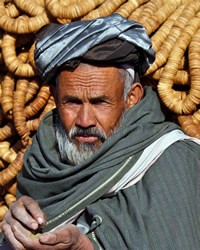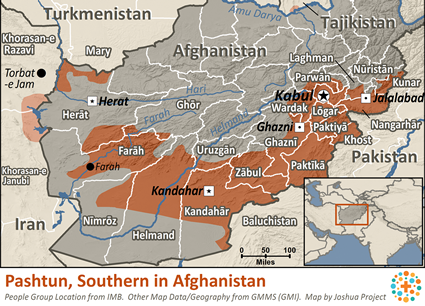The Pashtun of Afghanistan and Pakistan have been called the largest Muslim tribal society in the world. There are at least 30 major tribes, and countless sub-tribes and clans. Each clan can be friendly or hostile towards members of another particular clan, adding more divisions. Pashtuns share a unique sense of common identity. Pashtun identity is based on four elements: Heritage (descent from a common ancestor); Islam, the Pashtunwali Code of Honor ("The Way of the Pashtun"); and to some extent, Language (Pakhtu or Pashto). They live primarily in Afghanistan and Pakistan, though there is a significant Pashtun diaspora in the Arab Gulf and many Western countries.
The majority of Pashtun live in Pakistan. They are concentrated mainly in the northern and western provinces of Khyber Pakhtunkhwa and Baluchistan. The Durand Line (the border established under British colonial rule) divides traditional Pashtun homelands in Afghanistan and present-day Pakistan. However, due to tribal, linguistic, social and economic ties, the border is porous, and volatile—fertile ground for the drug trade, smuggling, and cross-border militancy.
The Pashtun were the traditional rulers of Afghanistan for over 250 years. During the 1990s, Pashtun tribal areas and thousands of Arab-funded madrassas (religious schools) throughout Pakistan, became the seedbed for the rise of the Taliban movement. Driven by a combination of religious zeal and Pashtun nationalism, and fueled by Arab money, the "Taliban" (a term for "religious students") imposed a harsh, hyper-conservative (Wahabi) version of Islam on the country.
This will be about those who speak one of the Southern Pashtun languages. Culturally and in terms of lifestyle issues, what we say here also applies to those who speak other Pashtun languages. More significant than dialectical differences, a Pashtun's primary loyalty is to his particular social group (tribe or sub-tribe).
Typically they are farmers or livestock herders living in a dry land. Only one-eighth of Afghanistan's land is arable, and they only use half of that. They grow or import from Pakistan enough grain to make nan, a form of bread, as their staple food. Commonly Southern Pashtun families own cattle; dairy products are also staple foods. Those who grow opium poppies earn a far greater income than those who grow needed food.
Some areas either have enough water or they can use irrigation to grow cotton, fruits and nuts. They export many of these products but also consume some on a local level.
Others are involved with mining or manufacturing, though these involve a smaller portion of the Southern Pashtun population.
Transporting goods is made difficult by a couple of factors. Afghanistan has few navigable rivers and there are only a couple of good roads. Another factor is the presence of armed militias that make trade difficult and make demands on those who produce valuable goods.
The greatest barriers to faith are social and cultural. Pashtuns almost always identify as Sunni Muslims. They will be married in a Sunni mosque, and to be associated with another religious system would be unacceptable in their community. Those who want to take Christ to the Pashtuns will need to do just that; take Christ to them, not a religious system. Since Jesus Christ personifies absolute holiness, those who face injustice and harsh lives might be drawn to him. Their code of honor, Pashtunwali, is also central to their belief system.
Pray for the production and distribution of all forms of media in the Pashto language, including literature, videos, music, movies, radio, websites, and social media.
Pray for accuracy in the Bible translations in progress.
Pray for more workers to serve the Pashtun people—in education, business, healthcare, development and other professional areas.
Pray for God's Spirit to strengthen and protect new believers and to empower their lives and witness!
Scripture Prayers for the Pashtun, Southern in Afghanistan.
https://www.bing.com/search?pglt=675&q=How+do+common+herders+and+farmers+live+in+Afghanistan%3F&cvid=6ef4754f5577482a982e20d04cf4df49&gs_lcrp=EgRlZGdlKgYIABBFGDkyBggAEEUYOTIICAEQ6QcY_FXSAQkxMjI3NGowajGoAgWwAgE&FORM=ANNAB1&PC=U531
https://www.britannica.com/place/Afghanistan/Agriculture-and-forestry
| Profile Source: Joshua Project |
| Other PDF Profile |


























